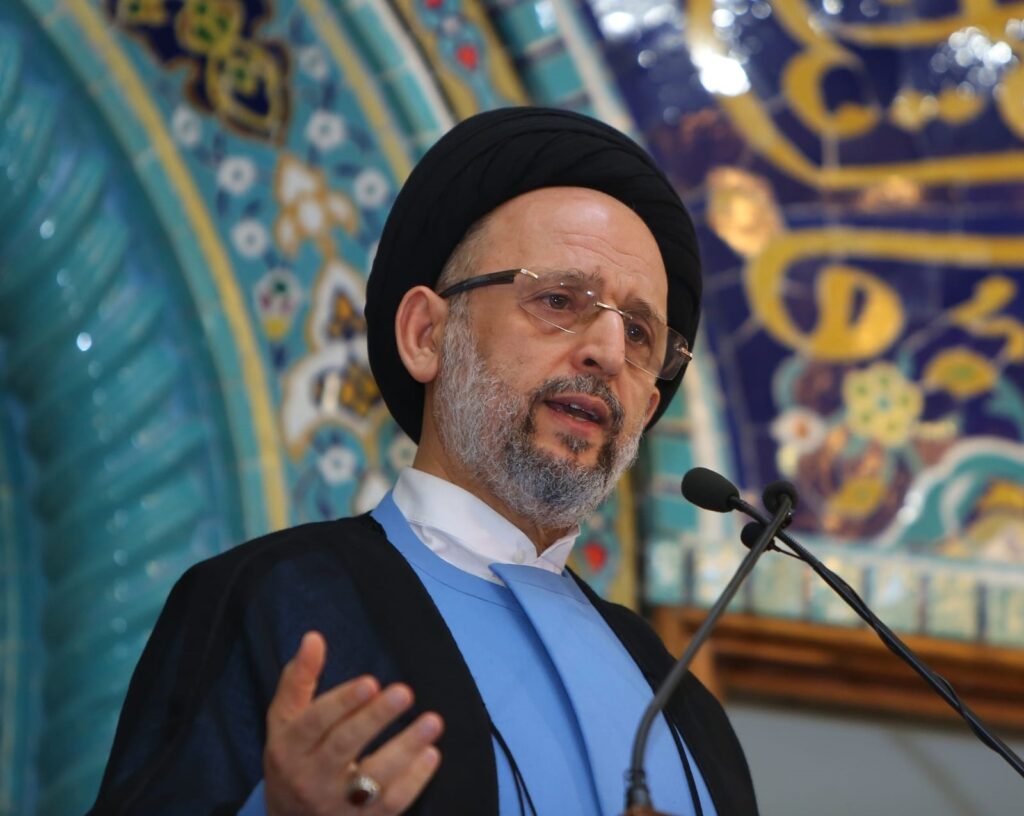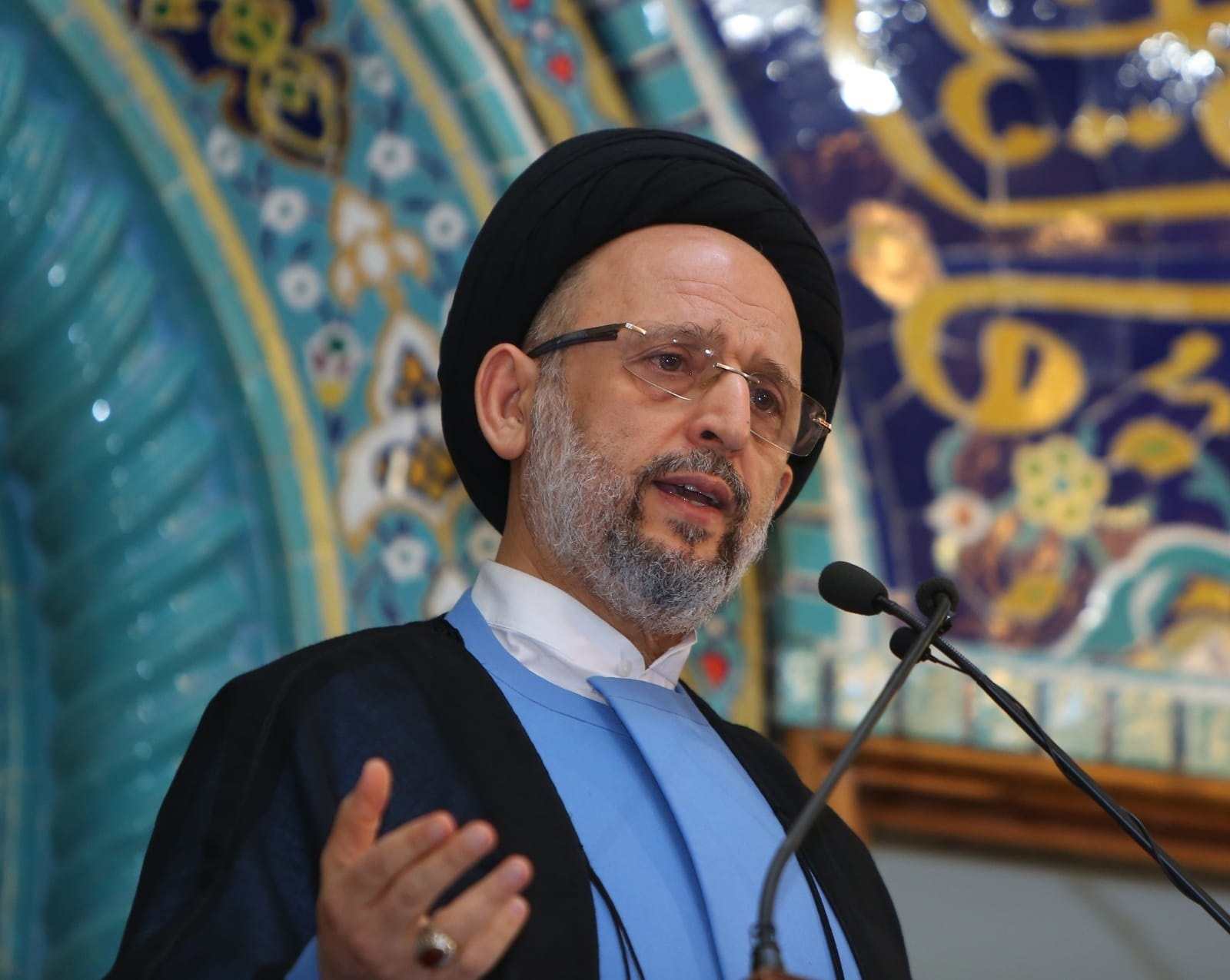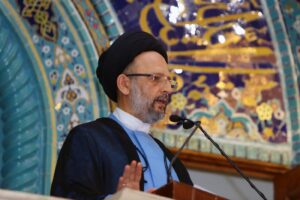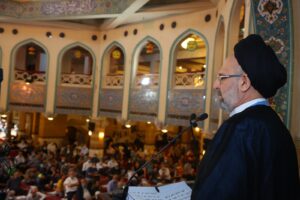In The Name of Allah, The Compassionate, The Merciful. The objectives of fasting
His Eminence, Sayyed Ali Fadlallah, delivered the two Friday prayer sermons at the Imamain Al-Hassanain Mosque, Ramadan 5, 1445 /March 15, 2024. Several prominent religious scholars, dignitaries, and hundreds of believers attended the Jumu’a prayer. Following is a summary of the sermons.
The First Sermon
Allah, the Most Exalted, says in His Glorious Book:
“O you who have believed, decreed upon you is fasting as it was decreed upon those before you that you may become righteous – [Fasting for] a limited number of days. So, whoever among you is ill or on a journey [during them] – then an equal number of days [are to be made up]. And upon those who are able [to fast, but with hardship] – a ransom [as substitute] of feeding a poor person [each day]. And whoever volunteers excess – it is better for him. But to fast is best for you, if you only knew.” [Quran, 2:183-184]. Allah , the Most Exalted, has spoken the truth.
In this verse, Allah emphasized the importance of the obligation of fasting, a duty mentioned and called to in all previous heavenly religions, albeit in different forms and manners, as evidenced by the texts found in the Torah, the Gospel, and in the biographies of all the prophets. This is due to its role in building the character of individuals, fortifying them, and preparing them to be in the image desired by Allah.
Numerous Hadiths have highlighted the significance of this obligation. It is narrated from the Messenger of Allah (p.) that Allah, the Most Exalted, said: “Every action of the son of Adam is for him except fasting, for it is for Me and I shall reward for it.” And in another Hadith: “Fasting is a shield against the Fire.” The Commander of the Faithful (a.s.) said: “The sleep of the fasting person is worship, his silence is glorification [of Allah], his prayers are answered, and his actions are multiplied. Indeed, for the fasting person, at the time of breaking his fast, there is a supplication that is not rejected.”
… Another Hadith mentions: “The fasting person has two moments of joy: one when he breaks his fast, and the other when he meets his Lord.”
Fasting has been prescribed for numerous purposes, and it is necessary to achieve them, not limited to abstaining from food, drink, and other things that break the fast…
Today, we will discuss one of the most important goals for which fasting was prescribed, and, God willing, we will address other objectives in subsequent sermons.
This goal was clearly pointed out by Imam As-Sadiq (a.s. when he said: “Allah, Glorified and Exalted be He, has only prescribed fasting to equalize between the rich and the poor. Because the rich would not have felt the touch of hunger to show mercy to the poor, as whenever the rich desire something, they can afford it. Therefore, Allah wanted to equalize between His creation, and to make the rich experience the hunger and pain, so they can empathize with the weak, show mercy to the hungry, and provide for the thirsty.”
This Hadith clearly indicates that the purpose of this obligation is to awaken the sense of the rich towards the hunger and suffering of the poor, as their wealth might make them oblivious to the struggles of the less fortunate, leading them to neglect their duty towards them and helping to alleviate their suffering. It is important to note that by “rich”, it doesn’t only refer to those who possess vast wealth, but to anyone whose wealth exceeds their needs.
Allah, The Most Exalted, did not suffice with calling upon the believers to fulfill their obligations of Zakat and Sadaqah, as stated in the Ayat “And in their wealth, there is a rightful share for the beggar and the deprived.” And when He said: “Take, [O, Muhammad], from their wealth a charity by which you purify them and cause them increase, and invoke [Allah’s blessings] upon them. Indeed, your invocations are reassurance for them. And Allah is Hearing and Knowing.”
It is also mentioned in a Hadith: “Indeed, Allah has made obligatory Zakat on the wealth of the rich to be given as provision to the poor. No poor person becomes hungry except by what he has been deprived of by a wealthy person. Allah Almighty will hold them accountable and punish them severely.”
Furthermore, Allah wanted to emphasize this by provoking the feelings of the rich towards those suffering from poverty and difficulties, so that they do not just fulfill these duties and acts of charity out of obligation but out of genuine empathy and compassion towards them. This strengthens their spirit of giving and makes it enduring.
Hence, there is a association between the obligation of fasting and the responsibility of the wealthy towards the poor and needy. This connection is reinforced by what is mentioned in the verse we discussed earlier, which states that the alternative for those who are unable to fast, either due to illness or travel, is to feed a poor person for each missed day of fasting. Allah, Glorified and Exalted be He, said: “And upon those who are able [to fast, but with hardship] – a ransom [as substitute] of feeding a poor person [each day].”
We also find this in what Allah has mandated upon the fasting individuals at the end of the month of Ramadan on the day of Eid, by giving Zakat al-Fitra, considering it a completion of fasting for fasting is not complete without it…
Therefore, Muhammad (p.) emphasized in his sermon during Ramadan the importance of making this month a time for the wealthy to help the poor and those in need. He said: “O people: give charity to your poor and needy.” And “Whoever feeds a fasting person in this month [Ramadan], it will be a redemption for his past sins and emancipation from the Hellfire.”
It was said: “O Messenger of Allah, not all of us are capable of that?” So he said: “Evade the Fire even if with half a date,” and ” Fear Allah even if with a drink of water…”
The Messenger(p.) of Allah widened the circle of caring for people’s needs and sufferings, in the supplication that he invited us to recite every day: “O Allah, enrich every poor person, O Allah, satiate every hungry person, O Allah, clothe every naked person, O Allah, settle the debt of every debtor, O Allah, alleviate the distress of every distressed person, return every traveler to their family, O Allah, free every captive, O Allah, rectify every corrupt matter among the affairs of the Muslims, O Allah, heal every sick person, O Allah, relieve our poverty with Your wealth, O Allah, change our bad condition to a good one, O Allah, settle our debts and enrich us from poverty, surely You are capable of everything.” In this, he urged us to live the suffering of the hungry, those who cannot find clothing, debtors, the distressed, prisoners, the sick, those suffering from injustice and occupation.
Dear loved ones: We are in great need to strengthen the sense of responsibility towards those who suffer around us and those who need our help as much as we can. By doing so, we express our humanity and faith, for a believer is not truly a believer until he loves for his brother what he loves for himself.
This is the path through which one attains the love of Allah Almighty, for all creation are the dependents of Allah, and the most beloved among them to Him are those who are most beneficial to His dependents… and whoever brings joy to a household.
By doing so, we can alleviate the impact of the difficult economic and living conditions we are experiencing, where the poor are getting poorer and the rich are getting richer, necessitating synergy and cooperation to fulfill this responsibility. While we value individual initiatives and encourage them, recognizing their necessity, the main basis remains the strengthening of collective initiatives, supporting and enhancing them to play a greater role or to continue their impact.
Here, we appreciate the initiatives undertaken by individuals, organizations, and institutions that have carried this burden and fulfilled their responsibility, contributing to the betterment of our reality.
We must make this blessed month a workshop for aiding the poor, orphans, the needy, and those in need, considering it a measure of our success in fasting and a gauge of the acceptance of our deeds in it. For Allah will not suffice until He accepts our deeds in this month, not just observing fasting, night prayers, Quran recitation, supplications, and the revival of Laylat al-Qadr, for He will ask us: What have you done for My dependents? How have you served them?!
We want this month to be as Allah intended it, and as His Messenger (p.) and the Imams (a.s.) and the righteous worked for it to be, a month in which all of these people enjoy what brings joy to their hearts and smiles to their faces. Let us take the initiative to fulfill our responsibility towards them, not waiting for them to ask us before we give…
The second sermon
Worshippers of Allah, I advise you and advise myself
to remember on this day Abu Talib, the uncle of the Messenger of Allah, who fostered and protected him, and the father of Amir al-Mu’minin, whose anniversary of his death will pass on the seventh of the month of Ramadan. In honor of him and the role he played in caring for the Messenger of Allah, The Most Exalted. Abu Talib took care of the Messenger of Allah after the death of his grandfather, Abdul Muttalib, when he was eight years old. Abu Talib provided him with excellent care and protection… When the Messenger of Allah was sent, Abu Talib believed in his message and was his protector throughout his life, defending him against the aggression of the Quraysh tribe, benefiting from his position among them and enduring for that cause. One of his most notable hardships was when the Quraysh besieged him along with the Banu Hashim tribe, and decided not to marry or negotiate with them until they handed over the Messenger of Allah. Abu Talib refused the demand despite the severity of the siege, which lasted for three years, and did not back down until the Quraysh saw no benefit in continuing the siege, so they lifted it…
Abu Talib dedicated all his status and position in the way of Allah, so let us emulate him in his sacrifice, jihad, patience, and sacrifices. Let us give as he gave, and endure as he endured for the sake of Allah and His cause. In doing so, we will be more aware, responsible, and capable of facing challenges…
The beginning is from Gaza, where the state of stagnation continues in the ongoing negotiations and the lack of positivity shown by the Zionist entity, as it has not shown any willingness to respond to the legitimate demands insisted upon by the Palestinian negotiator, which call for stopping its aggression on the Gaza Strip and allowing the residents to return, while the Zionist entity seeks a temporary truce from the negotiations to enable it to recover its captives and then resume the war with even greater ferocity.
At this time, the Zionist enemy continues its massacres and atrocities against civilians and systematic destruction of residential buildings, infrastructure, hospitals, schools, and temples, continuing its policy of starvation in the blockade imposed on the Strip.
If there are any aids allowed by the enemy to pass, they are not aimed at meeting the needs of the people of the Strip, but rather to lessen the condemnations faced by this entity. We here reiterate what we previously said: the path to helping the Palestinian people does not stop at providing humanitarian aid, despite their dire need for it. Rather, it lies in stopping the bloodshed and preventing the insane war perpetrated by the Zionist entity on the Gaza Strip, which has reached the point of continuously targeting those seeking humanitarian assistance
Here, we must question the objectives behind building a seaport on the coasts of Gaza, especially since it has become clear that the real goal is not to provide humanitarian aid, as that could be achieved by opening the Rafah crossing and other crossings, which is easier and faster for delivering this aid, meaning that there are goals beyond that related to what may happen at Rafah or the situation that Gaza will face after the end of the aggression against it.
In the face of all that is happening, we renew our call to the Arab and Islamic countries not to stand and we want the Arab and Islamic peoples to raise their voices loudly to support this people and prevent the catastrophe intended to happen again.
It is unfortunate that we do not witness the required fervor from the majority of these peoples in the face of the suffering experienced by the Palestinian people, which if it continues will weaken their position and threaten their cause.
Here, we must commend the honorable national stance expressed by the tribes in Gaza, rejecting to be a tool for the Zionist enemy to consolidate its control over the Strip or to be against the resistance, and thereby denying the bloodshed and all the destruction that has occurred and continues to occur in Gaza.
In Lebanon, the scope of the Israeli aggression extends geographically and militarily. And the enemy’s threats to Lebanon continue, accompanied by exercises simulating a war on Lebanon…
Although we still see it as a form of intimidation to gain more concessions from this country and its resistance for the security of this entity and its settlers, that does not mean that the Lebanese should sleep on a bed of roses, but it calls on them to strengthen national immunity and unite their ranks to confront any adventure that this enemy may embark on.
Within Lebanon, we express our regret for the negative attitudes towards the nun who decided to express her humanity, faith, and religious and spiritual commitment to the teachings of Jesus Christ, in his humanity, love, and mercy for children suffering in this country due to the Zionist aggression that does not distinguish between one child and another, one Lebanese and another, or in her prayers for the resistance fighters who defend the homeland with all its sects against an enemy that targets all Lebanese and sees this country as its antithesis.
We call for honoring this nun, to strengthen this human logic that is the logic of all divine messages and upon which this country is built, for it is not built on fragmenting human feelings and dividing them for political, sectarian, or doctrinal calculations, but it should be for everyone, for humanity cannot be divided, and religions have come to enhance it.
Finally, amidst the difficult social reality and the rising prices that we experience every time the month of Ramadan approaches, which is the month of mercy, blessings, and goodness, we renew our call to the official authorities responsible for monitoring prices, whether the Ministry of Economy or municipalities, to strictly control the prices that have been skyrocketing and to stand against the greed of traders who do not experience the suffering of a human being in this country or the sanctity of this blessed month.





